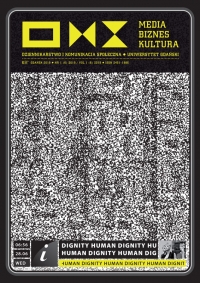Evolution of human cultural development within the context of the establishment of the Internet
Keywords:
cultural cultivating, web culture, network communication, collective intelligence, information freedom, Web 2.0Abstract
This article examines the evolution of the emergence of the Internet. It is shown how at first people created networks, and how subsequently the network became the influencer of human life. Conditional stages of formation of web culture as well as of that of values of network computer communication are characterized. It is highlighted what led to the origination of freedom of information. The transition from the non-commercial nature of the content to commerce and the mass of the Internet are also discussed. The development of Web 2.0 culture, which includes blogs, electronic encyclopaedias and social networks, is analysed. Finally, it’s shown how web 2.0 has become an integral part of the existence of the human-generation web culture. Also, the benchmark for Web 1.0 and Web 2.0 is described in Tim O Reilly’s article „What is Web 2.0?» It shows why and how blogs began, and what the subculture of bloggers do today. Additionally, the special role of video hosting Your Tube in the progress of the Internet is discussed, namely describing how YouTube has transitioned from a personal video hosting service towards a replacement for Television itself.Finally, the importance of social networks, which have become an interactive platform, that combines the ability to view videos, photos and communication in a single forum was also highlighted.
Downloads
References
About O’Reilly, https://www.oreilly.com/tim/ (access date: 10.03.2019).
Blogosphere, https://en.wikipedia.org/wiki/Blogosphere (access date: 5.12.2018).
Deleuze G., Guattari F., Capitalisme et schizophrénie. L’Anti-OEdipe, Les Editions de minuit, France 1972.
Google Inc., https://uk.wikipedia.org/wiki/Google (access date: 10.12.2018).
Internet, istoriya, https://uk.wikipedia.org/wiki/%D0%86%D0%BD%D1%82%D0%B5%D1%80% D0%BD%D0%B5%D1%82 (access date: 30.10.2018).
Jargon File, https://pl.wikipedia.org/wiki/Jargon_File (access date: 14.01.2018).
Joseph Carl Robnett Licklider, https://pl.wikipedia.org/wiki/Joseph_Carl_Robnett_Licklider (access date: 24.. 01.2014).
Kastel’s M., Stanovlenie obshhestva setevyh struktur. Novaja postindustrial’naja volna na Zapade: Antologija, ed. B.JI. Inozemceva. – M.: Academia, 1990.
Komp’yuterny’j virus, https://uk.wikipedia.org/wiki/%D0%9A%D0%BE%D0%BC%D0%BF% 27%D1%8E%D1%82%D0%B5%D1%80%D0%BD%D0%B8%D0%B9_%D0%B2%D1%96% D1%80%D1%83%D1%81 (access date: 16.11.2018).
Lanier J., You Are Not a Gadget: A Manifesto, Alfred A. Knopf, New York 2010.
Raymond Samuel Tomlinson, https://pl.wikipedia.org/wiki/Ray_Tomlinson (access date: 21.10.2018).
Sir Timothy John Berners-Lee, https://en.wikipedia.org/wiki/Tim_Berners-Lee (access date: 12.01.2019).
Tsareva A., Lyudy’na v merezhi: zmina veb-pokolin’, “Merezheve suspil’stvo ta merezhevi spil’noty’” 2012, No. 6, p. 36–54.
World internet usage and population statistics, https://www.internetworldstats.com/stats.htm (access date: 30.06.2018).

 Academic Scientific Journals
Academic Scientific Journals




